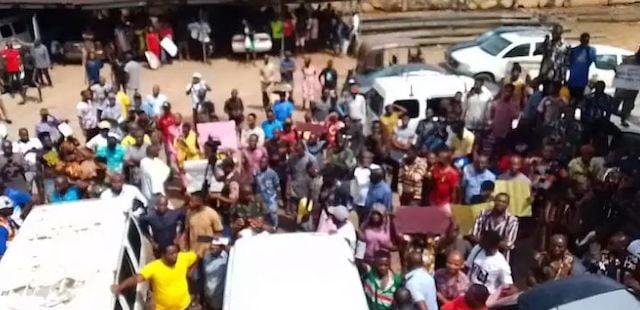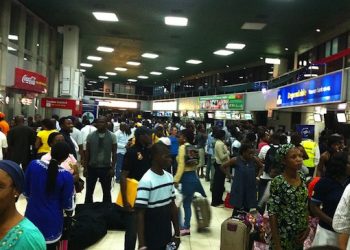Residents of Umuahia in Abia State on Tuesday took to the streets to protest what they described as harsh and unbearable electricity bills imposed by the Enugu Electricity Distribution Company.
Operating under the banner of Concerned Umuahia Residents, the protesters marched from the EEDC Umuahia office to the Abia State Government House, carrying placards with inscriptions such as “We cannot pay ₦50,000 bill,” “Return electricity bill to status quo,” and “Electricity bill is now minimum wage.”
Speaking on the occasion, the leader of the group, Chukwuemeka Ozugbo, said they gathered peacefully to express frustration over the recent sharp increase in electricity charges, explaining that most households previously paid about N10,000 monthly but now receive bills between N50,000 and N70,000 without any corresponding improvement in power supply or any notices.
While describing the sudden rise as outrageous and unjust, especially as most residents are civil servants who earn modest salaries, he questioned how someone earning N70,000 monthly could be expected to pay N50,000 for electricity when supply remains irregular and described the treatment from EEDC as unfair, and “violates natural justice and equity”.
He demanded that the company revert to the previous billing rate of about ₦10,000 per household, pointing out that many residents are on postpaid estimated billing and rarely enjoy consistent electricity.
A civil servant, Mr Nnamdi Okenwa who is on prepaid metering, lamented the rising cost of power units, stating that he previously spent N3,000 monthly but now pays between N15,000 and N17,000 despite limited usage, even as EEDC most times, supplies power briefly and then e, bark on disconnection exercises, and cutting off supply again after collecting payments.
Responding on behalf of the state governor, Alex Otti, the Commissioner for Power and Public Utilities, Mr Ikechukwu Monday, assured residents that their grievances would be officially addressed and resolved through peaceful and structured engagement, and commended them for their peaceful conduct while expressing their rights to fair billing.
He highlighted that residents had reported an increase in electricity tariff from ₦53 to ₦200 per kilowatt-hour, following the upgrade of their feeder to Band A by the EEDC, and urged affected residents to submit an official letter of complaint for proper documentation.
While noting that formal communication would enable the government to address the matter more effectively and transparently, he acknowledged ongoing challenges within Nigeria’s electricity sector, emphasising that the present administration in the state has made significant progress in improving power supply across communities, despite existing infrastructural limitations.
He said, “Power supply in the state has shown visible improvement, although there remains more to be done” and assured that continuous progress was being recorded under the current administration.
Monday stated that the government’s priority was ensuring residents are fairly billed, stressing that citizens should only pay for electricity consumed and reiterated the administration’s commitment to achieving complete metering across Abia State, disclosing that the Abia State Electricity Law was signed in March to establish the Abia State Electricity Regulatory Authority to oversee electricity matters locally.
He added that while regulation currently remains under the national commission, full control of electricity regulation would be transferred to the state by December, enhancing local accountability and efficiency for consumers, affirming that the government would engage the EEDC and relevant agencies to understand the tariff issue thoroughly, promising a peaceful and transparent resolution for affected residents.
He further disclosed that over 60,000 electricity meters had already been deployed across Abia State, a move aimed at ensuring accurate billing and efficient energy management for all electricity consumers.
Fielding questions from newsmen, the Head of Commercial, EEDC Abia, Mr Festus Iwuala, explained that the tariff increment resulted from the reclassification of the affected feeder to Band A by the Nigerian Electricity Commission, stating that the feeder had previously been categorized under Bands C and B, but as at 1st September 2025, was approved for Band A billing, reflecting higher electricity supply standards.
He said that adjustments are only applicable when errors occur, stressing that the recent change was based on national regulatory approval, not arbitrary decision-making by the distribution company and urged customers to understand the structure of the electricity tariff, noting that distribution companies operate strictly within approved policies and cannot independently increase tariffs without necessary regulatory authorisation.













































